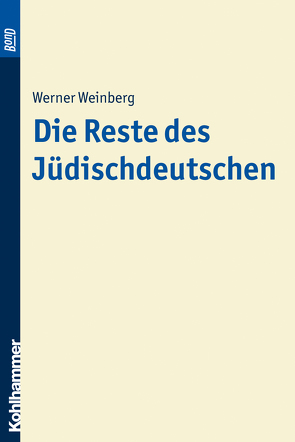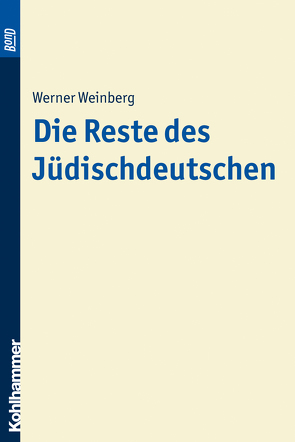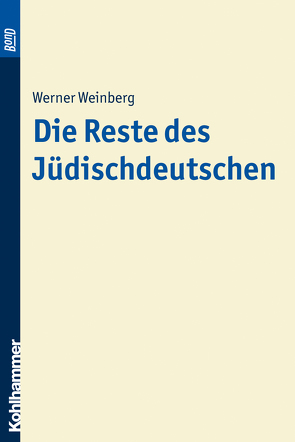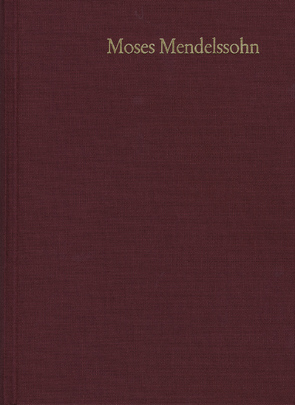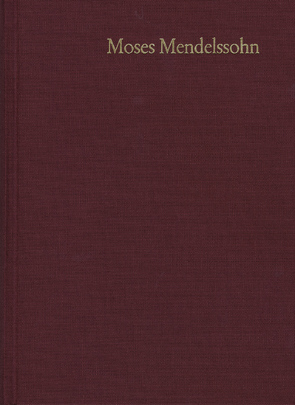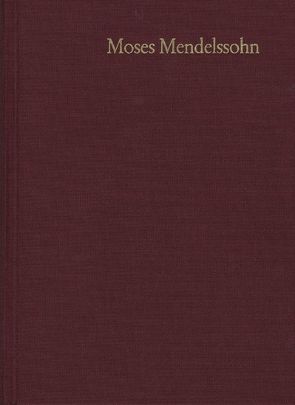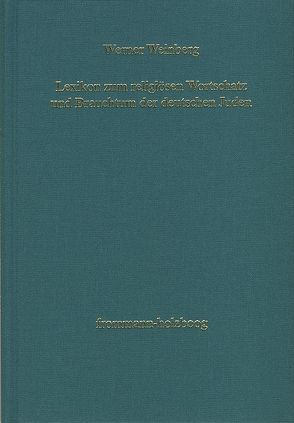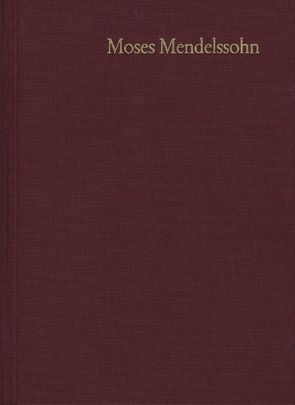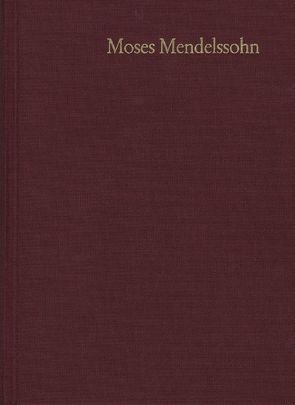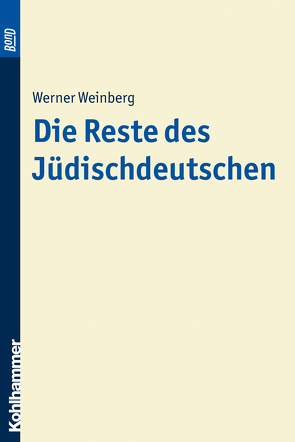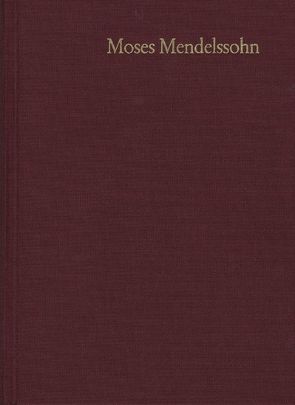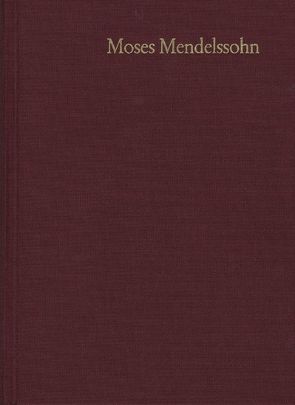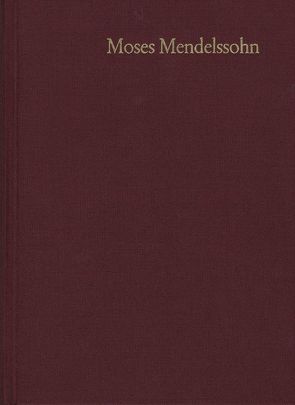Dieses Buch erhalten Sie als BonD-Ausgabe der 2. Auflage von 1973. Dabei handelt es sich um einen Nachdruck des vergriffenen Originaltitels - hergestellt auf Bestellung, mit einem hochwertigen Digitaldruckverfahren.
"Dem Autor gebührt Dank für sein mühevolles Unterfangen, die deutsche Kulturgeschichte in einem lokal wie sachlich eng begrenzten Raum, dem jüdischdeutschen Westfalens, wie es noch in den dreißiger Jahren lebendig war, durch seine lexikalische Arbeit festzuhalten und vor dem Verlust durch Vergessen zu bewahren."
(Orientalische Literaturzeitung)
Aktualisiert: 2023-06-30
> findR *
Dieses Buch erhalten Sie als BonD-Ausgabe der 2. Auflage von 1973. Dabei handelt es sich um einen Nachdruck des vergriffenen Originaltitels - hergestellt auf Bestellung, mit einem hochwertigen Digitaldruckverfahren.
"Dem Autor gebührt Dank für sein mühevolles Unterfangen, die deutsche Kulturgeschichte in einem lokal wie sachlich eng begrenzten Raum, dem jüdischdeutschen Westfalens, wie es noch in den dreißiger Jahren lebendig war, durch seine lexikalische Arbeit festzuhalten und vor dem Verlust durch Vergessen zu bewahren."
(Orientalische Literaturzeitung)
Aktualisiert: 2023-06-30
> findR *
Dieses Buch erhalten Sie als BonD-Ausgabe der 2. Auflage von 1973. Dabei handelt es sich um einen Nachdruck des vergriffenen Originaltitels - hergestellt auf Bestellung, mit einem hochwertigen Digitaldruckverfahren.
"Dem Autor gebührt Dank für sein mühevolles Unterfangen, die deutsche Kulturgeschichte in einem lokal wie sachlich eng begrenzten Raum, dem jüdischdeutschen Westfalens, wie es noch in den dreißiger Jahren lebendig war, durch seine lexikalische Arbeit festzuhalten und vor dem Verlust durch Vergessen zu bewahren."
(Orientalische Literaturzeitung)
Aktualisiert: 2023-06-30
> findR *
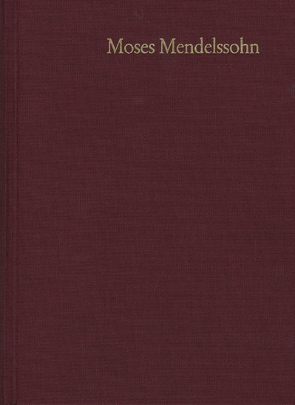
Band 10,1 enthält die Einleitungen und Texte, Band 10,2 die Lesarten und Anmerkungen. Die Texte eröffnet Mendelssohns deutsche Psalmenübersetzung, die ihm persönlich am Herzen lag. Weinberg vergleicht diese Übersetzung mit der traditionellen und der zeitgenössischen Bibelexegese und er ediert auch Mendelssohns Übersetzung des Hohenliedes, des Siegesliedes der Deborah, der Elegie an die Burg Zion (von Jehuda Halevi), eines Teils der ›Prüfung der Welt‹ (von Jedaja Hapenini Bederschi) und einen (von Kirnberger vertonten) Bußpsalm. Unter den von Altmann betreuten Texten befinden sich Übersetzungen hebräischer Danklieder sowie von Mendelssohn verfaßte Predigten und Oden. Dazu kommen die Abhandlungen über das umstrittene Gebet Alenu, ein philosophisches Gebet (›Andachtsübung eines Weltweisen‹) und Übersetzungen rabbinischer Kurzerzählungen (›Proben rabbinischer Weisheit‹). Die Texte zeigen Mendelssohn tief in der jüdischen Frömmigkeit verwurzelt.
Volume 10,1 contains the introductions and texts, volume 10,2 the versions and annotations. The texts start with Mendelssohn’s German translation of the Psalms, a project close to his heart. Weinberg compares this translation with the traditional and with contemporary biblical exegesis and also edits Mendelssohn’s translation of the Song of Solomon, the victory song of Deborah, the elegy to the fort of Zion (by Jehuda Halevi), part of the ›Trial of the World‹ (by Jedaja Hapenini Bederschi) and a penitential psalm, which was set to music by Kirnberger. Among the texts whichAltmann oversaw there are translations of Hebrew hymns of thanksgiving as well as sermons and odes written by Mendelssohn. There are also essays on the controversial prayer ›Aleinu‹, a philosophical prayer (›Religious Exercises of a Wise Man‹) and translations of rabbinical short stories (›Examples of Rabbinical Wisdom‹). The texts show Mendelssohn’s deep roots in Jewish piety.
Aktualisiert: 2022-10-12
> findR *
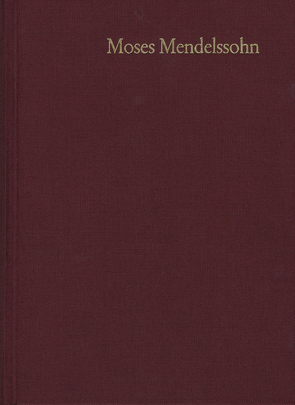
Die begleitenden Anmerkungen zur deutschen Übersetzung des ›Biur‹ erschließen die engen Bezüge, in denen dieser hebräische Kommentar zur Tradition der jüdischen Schriftauslegung steht. Nachweise der literarischen Quellen machen das kompositorische Verfahren Mendelssohns transparent und werfen Licht auf seine exegetische Argumentation; neben Zitaten aus Talmud und Midrasch werden Bezüge auf die Exegese in Mittelalter und Renaissance, auf die christliche Hebraistik und historisch-kritische Bibelwissenschaft sowie auf das naturwissenschaftliche Wissen des 18. Jahrhunderts offengelegt. Dabei werden auch jiddische und deutsche Bibelübersetzungen von Luther bis zu den christlichen Gelehrten des 18. Jahrhunderts berücksichtigt. Nicht zuletzt macht der Kommentar auf Verbindungen zu Mendelssohns philosophischem Werk aufmerksam.
The annotations which accompany the German translation of the ›Biur‹ reveal the close association between this Hebrew commentary and the tradition of Jewish interpretation of the Bible. Proof of the literary sources make Mendelssohn’s compositional technique transparent and shed light on his exegetical arguments. In addition to quotes from Talmud and Midrash, connections are revealed to exegesis in the Middle Ages and the Renaissance, to Christian Hebraic studies and historical-critical biblical studies as well as to the knowledge of natural sciences in the 18th century. In the process, Yiddish and German translations of the Bible from Luther to the Christian scholars of the 18th century have been incorporated. The commentary also calls attention to links to Mendelssohn’s philosophical works.
Aktualisiert: 2023-03-14
> findR *
Die vorliegenden Teilbände bieten die Übersetzung von Mendelssohns Einleitung und die Umschrift seiner Pentateuch-Übersetzung (siehe JubA Bände 15 bis 18) in das deutsche Alphabet. Der erste Teilband enthält Mendelssohns Umschrift des ersten und zweiten Buches Moses; der zweite Teilband das dritte bis fünfte Buch Moses sowie zwei Anhänge: Druckfehler in Mendelssohns Übersetzung; Grammatische Besonderheiten.
The volumes of this set provide a translation of Mendelssohn‘s introduction and the transcription of his Pentateuch translation (see JubA volumes 15 to 18) into the German alphabet. The first volume contains Mendelssohn›s transcription of the First and Second Book of Moses, and the second volume has the Third to the Fifth Book of Moses as well as two annexes which list typographical errors in Mendelssohn‹s translation and grammatical peculiarities.
Aktualisiert: 2022-10-12
> findR *
Die vorliegenden Teilbände bieten die Übersetzung von Mendelssohns Einleitung und die Umschrift seiner Pentateuch-Übersetzung (siehe JubA Bände 15 bis 18) in das deutsche Alphabet. Der erste Teilband enthält Mendelssohns Umschrift des ersten und zweiten Buches Moses; der zweite Teilband das dritte bis fünfte Buch Moses sowie zwei Anhänge: Druckfehler in Mendelssohns Übersetzung; Grammatische Besonderheiten.
The volumes of this set provide a translation of Mendelssohn‘s introduction and the transcription of his Pentateuch translation (see JubA volumes 15 to 18) into the German alphabet. The first volume contains Mendelssohn›s transcription of the First and Second Book of Moses, and the second volume has the Third to the Fifth Book of Moses as well as two annexes which list typographical errors in Mendelssohn‹s translation and grammatical peculiarities.
Aktualisiert: 2022-10-12
> findR *
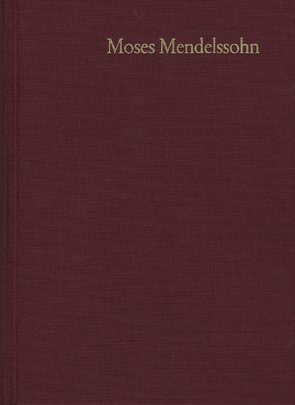
Band 10,1 enthält die Einleitungen und Texte, Band 10,2 die Lesarten und Anmerkungen. Die Texte eröffnet Mendelssohns deutsche Psalmenübersetzung, die ihm persönlich am Herzen lag. Weinberg vergleicht diese Übersetzung mit der traditionellen und der zeitgenössischen Bibelexegese und er ediert auch Mendelssohns Übersetzung des Hohenliedes, des Siegesliedes der Deborah, der Elegie an die Burg Zion (von Jehuda Halevi), eines Teils der ›Prüfung der Welt‹ (von Jedaja Hapenini Bederschi) und einen (von Kirnberger vertonten) Bußpsalm. Unter den von Altmann betreuten Texten befinden sich Übersetzungen hebräischer Danklieder sowie von Mendelssohn verfaßte Predigten und Oden. Dazu kommen die Abhandlungen über das umstrittene Gebet Alenu, ein philosophisches Gebet (›Andachtsübung eines Weltweisen‹) und Übersetzungen rabbinischer Kurzerzählungen (›Proben rabbinischer Weisheit‹). Die Texte zeigen Mendelssohn tief in der jüdischen Frömmigkeit verwurzelt.
Volume 10,1 contains the introductions and texts, volume 10,2 the versions and annotations. The texts start with Mendelssohn’s German translation of the Psalms, a project close to his heart. Weinberg compares this translation with the traditional and with contemporary biblical exegesis and also edits Mendelssohn’s translation of the Song of Solomon, the victory song of Deborah, the elegy to the fort of Zion (by Jehuda Halevi), part of the ›Trial of the World‹ (by Jedaja Hapenini Bederschi) and a penitential psalm, which was set to music by Kirnberger. Among the texts whichAltmann oversaw there are translations of Hebrew hymns of thanksgiving as well as sermons and odes written by Mendelssohn. There are also essays on the controversial prayer ›Aleinu‹, a philosophical prayer (›Religious Exercises of a Wise Man‹) and translations of rabbinical short stories (›Examples of Rabbinical Wisdom‹). The texts show Mendelssohn’s deep roots in Jewish piety.
Aktualisiert: 2022-10-12
> findR *
The volumes of this set provide a translation of Mendelssohn‘s introduction and the transcription of his Pentateuch translation (see JubA volumes 15 to 18) into the German alphabet. The first volume contains Mendelssohn›s transcription of the First and Second Book of Moses, and the second volume has the Third to the Fifth Book of Moses as well as two annexes which list typographical errors in Mendelssohn‹s translation and grammatical peculiarities.
Aktualisiert: 2019-07-15
> findR *
Gläubige Juden verfügen über einen großen Bestand an Wörtern und Wendungen aus dem religiösen Bereich. Er ist über die täglichen Gebete, den Sabbat- und Feiertagsgottesdienst, aber auch über das Talmudstudium vermittelt und kann zum Teil auch jenseits dieser ersten Gebrauchssphäre verwendet werden. Größtenteils ist er demzufolge hebräisch oder aramäisch - bei den deutschen Juden hebräisch oder aramäisch in aschkenasischer Aussprache. - In dem vorliegenden Lexikon hat Werner Weinberg eine Gesamtaufnahme dieses Wortschatzes eines durchschnittlich Gebildeten vorgelegt. Es handelt sich um einen ersten und wohl auch letzten Versuch, den Wortschatz der deutschen Juden im religiösen Bereich und seine Verwendungsweise zu dokumentieren, wie er in der ersten Hälfte des 20. Jahrhunderts unter Juden allgemein verwendet, von der nichtjüdischen Umgebung aber kaum wahrgenommen wurde.
Aktualisiert: 2019-01-08
> findR *
Volume 10,1 contains the introductions and texts, volume 10,2 the versions and annotations. The texts start with Mendelssohn’s German translation of the Psalms, a project close to his heart. Weinberg compares this translation with the traditional and with contemporary biblical exegesis and also edits Mendelssohn’s translation of the Song of Solomon, the victory song of Deborah, the elegy to the fort of Zion (by Jehuda Halevi), part of the ›Trial of the World‹ (by Jedaja Hapenini Bederschi) and a penitential psalm, which was set to music by Kirnberger. Among the texts whichAltmann oversaw there are translations of Hebrew hymns of thanksgiving as well as sermons and odes written by Mendelssohn. There are also essays on the controversial prayer ›Aleinu‹, a philosophical prayer (›Religious Exercises of a Wise Man‹) and translations of rabbinical short stories (›Examples of Rabbinical Wisdom‹). The texts show Mendelssohn’s deep roots in Jewish piety.
Aktualisiert: 2022-10-12
> findR *
The volumes of this set provide a translation of Mendelssohn‘s introduction and the transcription of his Pentateuch translation (see JubA volumes 15 to 18) into the German alphabet. The first volume contains Mendelssohn›s transcription of the First and Second Book of Moses, and the second volume has the Third to the Fifth Book of Moses as well as two annexes which list typographical errors in Mendelssohn‹s translation and grammatical peculiarities.
Aktualisiert: 2022-10-12
> findR *
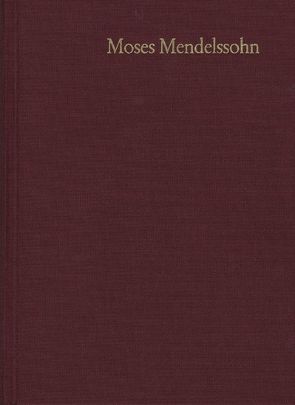
The Pentateuch. Introduction to volumes 15-18 by Werner Weinberg. Das Hohelied.
Edited by Werner Weinberg
Volumes 15 to 18 provide a reproduction of Mendelssohn’s Pentateuch edition (›Netivot ha schalom‹ – ›The Paths of Peace‹, Berlin: George Friedrich Starcke 1780–1783), as well as a translation of the Song of Solomon (›Megillat schir ha-schirim‹, Berlin: Jüdische Freischule 1784/85). In addition to the biblical text, the Pentateuch edition includes Mendelssohn’s German translation, the commentary (›Biur‹) which he wrote together with his colleagues Salomo Dubno, Naftali Herz Wessely, Aaron Jaroslaw and Herz Homberg as well as the Masoretic texts by Salomo Dubno and Schalom Meseritz (›Tikkun sofrim‹). At the beginning of this edition there are approbations, a treatise and a poem by Wessely, the fragmentary introduction by Dubno, Mendelssohn‘s own introduction as well as a list of subscribers. The introduction gives a detailed description of the origins and the reception of this pivotal work of Jewish Enlightenment.
Aktualisiert: 2019-07-15
> findR *
Dieses Buch erhalten Sie als BonD-Ausgabe der 2. Auflage von 1973. Dabei handelt es sich um einen Nachdruck des vergriffenen Originaltitels - hergestellt auf Bestellung, mit einem hochwertigen Digitaldruckverfahren.
"Dem Autor gebührt Dank für sein mühevolles Unterfangen, die deutsche Kulturgeschichte in einem lokal wie sachlich eng begrenzten Raum, dem jüdischdeutschen Westfalens, wie es noch in den dreißiger Jahren lebendig war, durch seine lexikalische Arbeit festzuhalten und vor dem Verlust durch Vergessen zu bewahren."
(Orientalische Literaturzeitung)
Aktualisiert: 2023-04-04
> findR *
Volumes 15 to 18 provide a reproduction of Mendelssohn’s Pentateuch edition (›Netivot ha schalom‹ – ›The Paths of Peace‹, Berlin: George Friedrich Starcke 1780–1783), as well as a translation of the Song of Solomon (›Megillat schir ha-schirim‹, Berlin: Jüdische Freischule 1784/85). In addition to the biblical text, the Pentateuch edition includes Mendelssohn’s German translation, the commentary (›Biur‹) which he wrote together with his colleagues Salomo Dubno, Naftali Herz Wessely, Aaron Jaroslaw and Herz Homberg as well as the Masoretic texts by Salomo Dubno and Schalom Meseritz (›Tikkun sofrim‹). At the beginning of this edition there are approbations, a treatise and a poem by Wessely, the fragmentary introduction by Dubno, Mendelssohn‘s own introduction as well as a list of subscribers. The introduction gives a detailed description of the origins and the reception of this pivotal work of Jewish Enlightenment.
Aktualisiert: 2019-07-15
> findR *
Volume 10,1 contains the introductions and texts, volume 10,2 the versions and annotations. The texts start with Mendelssohn’s German translation of the Psalms, a project close to his heart. Weinberg compares this translation with the traditional and with contemporary biblical exegesis and also edits Mendelssohn’s translation of the Song of Solomon, the victory song of Deborah, the elegy to the fort of Zion (by Jehuda Halevi), part of the ›Trial of the World‹ (by Jedaja Hapenini Bederschi) and a penitential psalm, which was set to music by Kirnberger. Among the texts whichAltmann oversaw there are translations of Hebrew hymns of thanksgiving as well as sermons and odes written by Mendelssohn. There are also essays on the controversial prayer ›Aleinu‹, a philosophical prayer (›Religious Exercises of a Wise Man‹) and translations of rabbinical short stories (›Examples of Rabbinical Wisdom‹). The texts show Mendelssohn’s deep roots in Jewish piety.
Aktualisiert: 2022-10-12
> findR *
The annotations which accompany the German translation of the ›Biur‹ reveal the close association between this Hebrew commentary and the tradition of Jewish interpretation of the Bible. Proof of the literary sources make Mendelssohn’s compositional technique transparent and shed light on his exegetical arguments. In addition to quotes from Talmud and Midrash, connections are revealed to exegesis in the Middle Ages and the Renaissance, to Christian Hebraic studies and historical-critical biblical studies as well as to the knowledge of natural sciences in the 18th century. In the process, Yiddish and German translations of the Bible from Luther to the Christian scholars of the 18th century have been incorporated. The commentary also calls attention to links to Mendelssohn’s philosophical works.
Aktualisiert: 2023-03-14
> findR *
MEHR ANZEIGEN
Bücher von Weinberg, Werner
Sie suchen ein Buch oder Publikation vonWeinberg, Werner ? Bei Buch findr finden Sie alle Bücher Weinberg, Werner.
Entdecken Sie neue Bücher oder Klassiker für Sie selbst oder zum Verschenken. Buch findr hat zahlreiche Bücher
von Weinberg, Werner im Sortiment. Nehmen Sie sich Zeit zum Stöbern und finden Sie das passende Buch oder die
Publiketion für Ihr Lesevergnügen oder Ihr Interessensgebiet. Stöbern Sie durch unser Angebot und finden Sie aus
unserer großen Auswahl das Buch, das Ihnen zusagt. Bei Buch findr finden Sie Romane, Ratgeber, wissenschaftliche und
populärwissenschaftliche Bücher uvm. Bestellen Sie Ihr Buch zu Ihrem Thema einfach online und lassen Sie es sich
bequem nach Hause schicken. Wir wünschen Ihnen schöne und entspannte Lesemomente mit Ihrem Buch
von Weinberg, Werner .
Weinberg, Werner - Große Auswahl an Publikationen bei Buch findr
Bei uns finden Sie Bücher aller beliebter Autoren, Neuerscheinungen, Bestseller genauso wie alte Schätze. Bücher
von Weinberg, Werner die Ihre Fantasie anregen und Bücher, die Sie weiterbilden und Ihnen wissenschaftliche Fakten
vermitteln. Ganz nach Ihrem Geschmack ist das passende Buch für Sie dabei. Finden Sie eine große Auswahl Bücher
verschiedenster Genres, Verlage, Schlagworte Genre bei Buchfindr:
Unser Repertoire umfasst Bücher von
- Weinberger, Alfred
- Weinberger, Alina
- Weinberger, Anita
- Weinberger, Anja
- Weinberger, Anna
- Weinberger, Annja
- Weinberger, Anton Jakob
- Weinberger, Armin
- Weinberger, Bine
- Weinberger, Christian
Sie haben viele Möglichkeiten bei Buch findr die passenden Bücher für Ihr Lesevergnügen zu entdecken. Nutzen Sie
unsere Suchfunktionen, um zu stöbern und für Sie interessante Bücher in den unterschiedlichen Genres und Kategorien
zu finden. Neben Büchern von Weinberg, Werner und Büchern aus verschiedenen Kategorien finden Sie schnell und
einfach auch eine Auflistung thematisch passender Publikationen. Probieren Sie es aus, legen Sie jetzt los! Ihrem
Lesevergnügen steht nichts im Wege. Nutzen Sie die Vorteile Ihre Bücher online zu kaufen und bekommen Sie die
bestellten Bücher schnell und bequem zugestellt. Nehmen Sie sich die Zeit, online die Bücher Ihrer Wahl anzulesen,
Buchempfehlungen und Rezensionen zu studieren, Informationen zu Autoren zu lesen. Viel Spaß beim Lesen wünscht Ihnen
das Team von Buchfindr.
